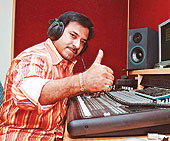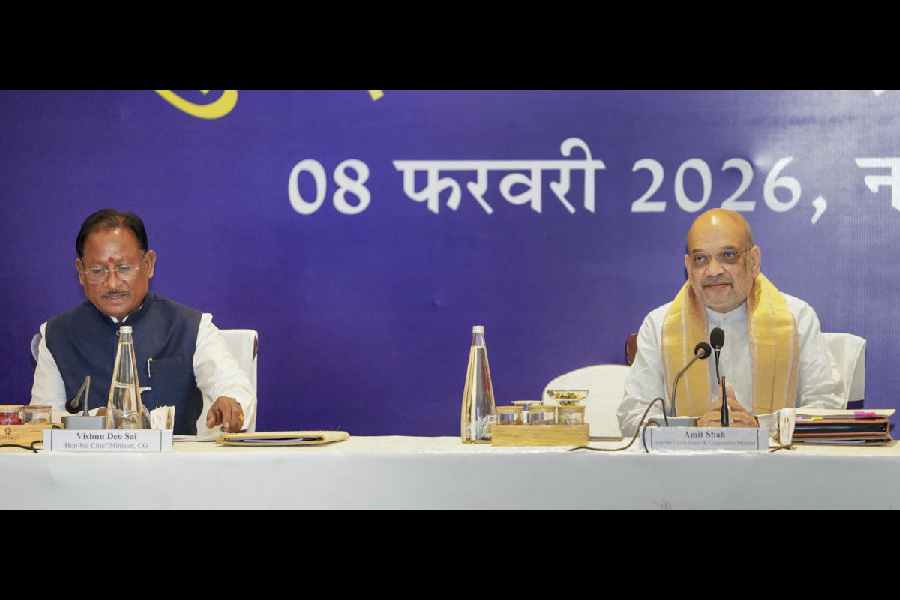 |
 |
 |
 |
 |
 |
 |
| (From top): Sunny Sarid at the Sound of Music; Sandeep Verma gives aspiring bartenders tips at his institute; Seema Malhotra shows the finer points of make-up at Eve’s Beauty and Hair Academy; young girls learn the tricks of the trade at Mumbai’s Gemmological Institute; Jimmy Tangree at Red FM; Leena Mogre shows people the ropes of fitness at her school; a class of students from the National School of Events. |
The times they are a’ changing.” It used to be that kids with dreams of making it big were traditional in their choices. They trained to be doctors, lawyers, engineers or opted for an MBA. Nowadays, though, when you ask students what they want to do when they finish school, you’ll get a range of answers. There’s suddenly a big appetite for different careers.
Take Archana Banerjee, a Class XII Calcutta student, for instance. She’s thinking of a career ? yes ? in jewellery designing. Similarly, hundreds of miles away in Mumbai, Snehal Parekh, has decided what she wants to be ? an event manager, someone who makes things ? birthdays, weddings, office bashes ? happen.
A student at Ruparel College, Parekh dreams of setting up her own event management company once she learns the ropes. “Events are happening every day and there’s great career scope. And once you’re trained in it, it can be pretty lucrative,” says Parekh.
Parents, too, are coming around to the notion that their kids may want to tread different paths to success. Many areas like gem and jewellery designing, fitness, beauty, bartending and event management were looked down on in the past but are emerging as hot middle-class career options.
Says Mumbai-based education counsellor Sudipta Dhruva, “Before, anyone venturing into these sectors were considered average or a ‘loser’. But these mindsets are changing fast as more and more youngsters take up these careers and do well.” Reenu Saraf of Ma Foi Placement Consultants agrees, “Right now, the job market is dynamic and there are so many options. Now students are aware of changing trends and ready to try new avenues.”
Take the fitness business which is on a roll, throwing up a range of job choices such as personal trainers, physical instructors or sports therapists. What’s helped the boom is a growing emphasis on looking after yourself. Says Mumbai-based fitness trainer Leena Mogre, “You can earn anywhere between Rs 5,000 and Rs 10,000 a month as a fitness instructor or set up a gym. Experienced trainers also double as personal trainers to celebrities and earn Rs 1,000 for one-hour sessions.”
But first you need the qualifications and this where Mogre’s school comes in. Her Mogre’s Fitness Academy offers three certificate courses ? Fitness Management, Diet and Nutrition and Power Yoga. Another Mumbai fitness academy faring well is K11 Fitness Academy set up by Kaizzad Capadia, who has 15 years experience. It offers courses ranging from Personal Trainer Course, Group Fitness Instructor Course, Sports Nutrition and Massage Therapy. The K11 certificate courses, costing between Rs 7,500 and Rs 14,100, are held in high regard and the students get good placements.
Another booming area is beauty and make-up. Since now it’s all about looking good, trendy and expensive salons are the order of the day and being a beautician can mean big bucks. Creating a style is “like forming a personality,” says Seema Malhotra, owner of Eve’s Beauty and Hair Academy in New Delhi. At this institute which offers basic to advanced courses, students learn personal grooming, aromatherapy, make-up and skin treatments. The academy also provides International Vocational Qualifications, costing between Rs 2,500 to Rs 50,000 that go from beginner to advanced for hair and beauty therapy. The exams are verified by the London City and Guilds Verifiers and Quality Inspectors. Says Malhotra, “Job prospects are huge. You can work as a consultant with beauty and health companies, work in films as a make-up artist, consultants in malls or start your own parlour. Students also get placements with firms like L’Oreal and Biotique and good salons recruit our students.”
There’s great scope in make-up because demand for make-up artists is rising with the growth of TV and the fashion industry. But, says make-up guru Shahnaz Hussain, to get good, you have to practise, practise, practise and “keep learning about new techniques and make-up cosmetics”.
Ever thought of being a bartender? It’s no longer just about pouring drinks, it has gone pro too. Meet Delhi-based Sandeep Verma, who decided to found a bartending institute when he saw an expanding need for skilled bartenders in hotels. Verma, a grad of Goa’s Institute of Hotel Management, set up the Institute of Bar Operations and Management in 2000. It’s now India’s premier bar institute, imparting training in bar operations, management, design and what all bartenders need ? flair. It’s also ranked with leading bar schools around the world. Says Verma, “When I started this institute, bartending was frowned upon. But students now see bartending as a career option. Our students have found good jobs in places like the Taj Mahal Mumbai and US cities. Some have even set up their own bartending companies. And guess what? He says, “if you’ve a talent for this career, you can earn up to Rs 50,000 a month.”
Another sunrise industry is gem and jewellery design. For those interested in working in a jewellery store, technical schools in India offer several short-term and long-term courses. The Indian Institute of Gems and Jewellery (IIGJ), set up by the Gem and Jewellery Export Promotion Council (GJEPC) in Mumbai, features courses to help students develop expertise where focus is on design, technology and manufacturing. Courses cost from Rs 15,000 to Rs 25,000 and include introduction to gemmology and basic jewellery making to computer-aided jewellery design.
Says IIGJ chairman Tanveer Choksy, “We’ve an office offering placements to grads. You can either start out on your own or be hired by major jewellery brands and stores across India.” One happy graduate from Mumbai’s Gemmological Institue of India is 23-year-old Prachi Shirodkar. She says, “I’ve a diploma in jewellery designing and today, I’m doing independent work and take bulk orders from clients. At first my parents objected to me taking up a ‘vocational course’. They wanted me to study something in the sciences. But I was determined and today I am getting a good salary. I also have offers from big jewellery stores ? but I’m taking it slowly.”
One thing that has helped popularise these ‘alternative careers’ is the likelihood of a reasonable pay packet in a short timespan. Take for instance, becoming a radio jockey or a deejay. It’s not only high profile but also one can earn a fat pay packet : anything between Rs 7,000 to Rs 1 lakh a month once you’re really good. Says Jimmy Tangree, one of Calcutta’s best-know radio jockeys, “A good radio jockey should have the gift of the gab and a decent music knowledge.”
But people who are all thumbs, better think of another line of work. “You have to be extremely tech-savvy. Things are run on the high-tech Radio Computing Services Software which requires a fair bit of technical knowledge that can only be learnt on the job,” he warns. And this is one job for which there are long queues. Jimmy started out as a deejay in the 1980s when the profession was in its nascent phase. Now he’s a household name on Calcutta’s airwaves. Right now working as station head, 93.5 Red FM, Calcutta, he’s seen a huge rise in the number of people wanting to become radio jockeys. In fact, he says, he has a whopping 78,000 resumes from would-be disc-spinners lying in his Red FM office.
To learn to be a radio jockey or DJ where you do events such as graduations or weddings or work at clubs or hotels, there’s Sunny Sarid’s deejaying school in Delhi ? the Sound of Music. Sarid says to be a good DJ, you need a feel for rhythm and crowd mood. At his school, where course costs range up to Rs 50,000, students learn different kinds of music, mixing, doing set-ups with sound equipment mixing music and handling studio equipment. Says Sarid, “Our job is to teach them the tricks of the trade and expose them to the deejay world. After that, it’s up to the individual. Once he establishes himself onhe circuit, he can rake in as much as Rs 50,000-70,000 a month.”
And finally, let’s look at event management. It has become the buzzword in career opportunities, fuelled by companies wanting to put on special evenings for clients or employees, corporate shows and people with money to burn on weddings or other celebrations. While earlier, event management professionals were self-taught ? they were just natural organisers ? now there’s training available. One school is Mumbai’s National School of Event Management where courses range in price from Rs 18,000 to Rs 25,000 and offer diplomas in event management and promotion. Affiliated to the International Festival and Event Association, USA, NSE puts students through the ropes of learning about event management. Those graduating have been offered jobs in Balaji Telefilms, Zee Telefilms and Mumbai’s malls, among other places.
Says NSE director Rasika Ranadive, “As a career, it’s boomed recently with all the big parties, fashion shows, concerts and conferences happening. Prashant Chandran, editor of www.eventsdomain.com agrees. “There’s a boom in this sector that can be attributed to the fact there’s been a rise in events across India and there’s a need for manpower to organise these events.”
There are some who doubt the usefulness of these career institutes as they offer only diploma courses, not academic degrees. Dhruva begs to differ and for parents worried about their kids taking up ‘non-professional’ lines of work, her words are worth listening to, “In India there are millions of graduates doing nothing. So there’s nothing wrong in doing a diploma course after Class XII that’s geared to the job market. Nowadays, vocational courses have opened up and students are much more willing to take them because they know they will help them get a well-paid job.” Sounds like dollars and sense.
Photographs by Rupinder Sharma, Gajanan Dudhalkar and Rashbehari Das.
 |










